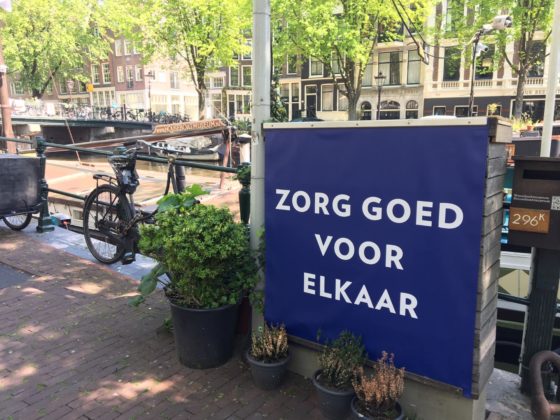Easing the Dutch coronavirus rules: what the experts say

 Dutch coronavirus experts are out in force in Saturday’s papers. Here’s a round-up of what they have to say.
Dutch coronavirus experts are out in force in Saturday’s papers. Here’s a round-up of what they have to say.
Jaap van Dissel, epidemiologist and the public face of the public health institute RIVM, tells the NRC that not all the earlier-agreed conditions for relaxing the Dutch ‘intelligent’ lockdown have been achieved but that the primary reasons – making sure the health service is not overloaded and protecting the vulnerable – remain central to strategy.
The virus has been rampaging through nursing homes, but Van Dissel told the paper, it is still too early to draw conclusions. ‘Nursing homes would appear to be a separate problem, and we don’t know if this could have been solved. In fact there have been lots of deaths in nursing homes throughout Europe,’ he says.
He rejects suggestions that the Netherlands should have gone for the Swedish approach. ‘No, then we would have been overtaken,’ he said. ‘In Sweden the spread has been far more gradual, without the Carnaval boost which we had.’
And he again repeated the view that face masks do not have any added value if people keep 1.5 metres apart. ‘And the question remains, will their use [on public transport] have a negative affect and that people go out when they are ill?’
Hand washing
Van Dissel and Jacco Wallinga, who models the potential spread of the virus for the RIVM, are also interviewed by broadcaster NOS.
Van Dissel again emphasised that partial lifting of anti-coronavirus regulations will depend on a step-by-step approach, and each step will require proper monitoring. ‘The first steps involve giving individuals more freedom in terms of local activities and person to person contact,’ he said. ‘Then, depending on the effect, you can bring in more regional and group activities.’
The likely impact, said Wallinga, is difficult to predict, because people will change their behaviour. ‘We don’t know if people will keep to the basis hygiene rules, such as washing your hands and keeping your distance, during the summer holidays. And that could make a big difference.’
Lock down
In the Telegraaf, public safety expert and university professor Ira Helsloot says he considers the lockdown has already lasted too long. He points out the figures about hospital admissions and deaths carry a two-week time lag because it takes some time for people to develop symptoms and that Sweden, which has not gone into lockdown, has not had an explosion of cases.
‘So leave it to companies to come up with the best and most achievable measures, and let the Dutch themselves make choices about the risks they want to run,’ he told the paper. ‘Who is in poor health, should avoid busy locations. Who is young should not worry about visiting a busy cafe, when you compare it to all the other risks they run in daily life.’
Solidarity
The Dutch have opted not to do open everything up again for two reasons – to show solidarity with the vulnerable elderly and out of fear of a second wave, he said.
‘Make no mistake, coronavirus has not left the Netherlands or the rest of the world,’ he said. ‘And that means in the coming year we should set up special hospitals for coronavirus patients with specialist care, so we don’t have to burden other care services.
After all in the 1950s we had such hospitals for tuberculosis patients. So we know all about it.’
New wave
Virologist Marion Koopmans is interviewed by the AD and looks back at the ‘crazy’ and ‘bizarre’ months behind us. However, she does not think the virus has had its day. ‘I expect a new wave,’ she told the paper.
This week Koopmans and the rest of the government’s Outbreak Management Team drew up the basic framework for relaxing the Dutch ‘intelligent’ lockdown – but steering clear of the economic impact. ‘If you are talking about starting up the economy again, because the cracks are starting to emerge, then we are not the ones who decide – the cabinet was and still is.
‘We can give advice about how people should behave, about testing and detection capacity and the like. And the RIVM has to keep a finger on the pulse. The easing won’t take place if people don’t behave in the recommended way, and that is really important. Keeping your distance, keeping away from groups… if that goes wrong, then we have a mega problem.’
Andreas Voss, infectious diseases professor at Radboud University’s teaching hospital, told the Volkskrant that the cabinet has always made it clear that the aim of the Dutch measures has been not to avoid every infection, but to make sure that the healthcare system continues to function.
‘Shutting everything down is easy,’ Voss said. ‘Letting things go again, now that is complicated.’
Thank you for donating to DutchNews.nl.
We could not provide the Dutch News service, and keep it free of charge, without the generous support of our readers. Your donations allow us to report on issues you tell us matter, and provide you with a summary of the most important Dutch news each day.
Make a donation